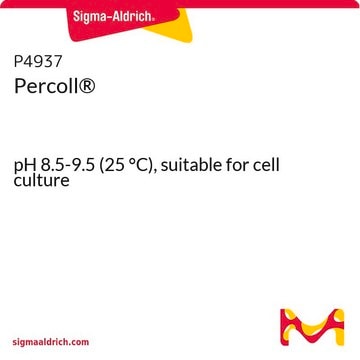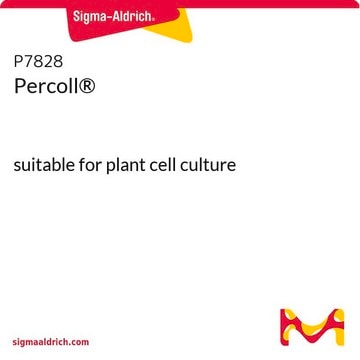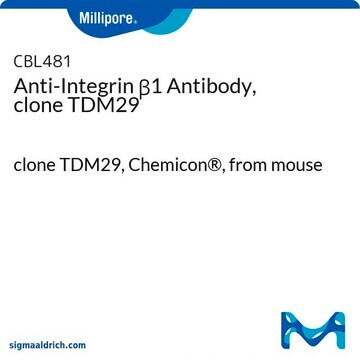Percoll is produced by Cytiva, formerly known as GE Life Sciences. Details regarding the proprietary manufacturing process are not publicly available. However, it can be mentioned that the Percoll particles range in size from 15 to 30 nanometers. While the density of Percoll solution is measured, the specific information regarding the amount of coating on the silica particles is not provided.
P1644
Percoll®
pH 8.5-9.5 (20 °C)
Synonyme(s) :
Milieu à gradient de densité Percoll
About This Item
Produits recommandés
Stérilité
aseptically filled
Niveau de qualité
Forme
colloidal ((Colloidal solution of silica coated with polyvinylpyrrolidone (PVP)) )
Technique(s)
cell culture | mammalian: suitable
Couleur
clear colorless to faint yellow
pH
8.5-9.5 (20 °C)
Application(s)
hematology
histology
Température de stockage
2-8°C
Vous recherchez des produits similaires ? Visite Guide de comparaison des produits
Description générale
Application
Informations légales
Produit(s) apparenté(s)
Code de la classe de stockage
10 - Combustible liquids
Classe de danger pour l'eau (WGK)
WGK 3
Point d'éclair (°F)
Not applicable
Point d'éclair (°C)
Not applicable
Équipement de protection individuelle
Eyeshields, Gloves
Faites votre choix parmi les versions les plus récentes :
Certificats d'analyse (COA)
Vous ne trouvez pas la bonne version ?
Si vous avez besoin d'une version particulière, vous pouvez rechercher un certificat spécifique par le numéro de lot.
Déjà en possession de ce produit ?
Retrouvez la documentation relative aux produits que vous avez récemment achetés dans la Bibliothèque de documents.
Les clients ont également consulté
Articles
Centrifugation enables the separation of particles by sedimentation. Learn how to separate particles using a centrifuge and how to use Stokes' law to calculate the velocity of sedimentation.
Centrifugation enables the separation of particles by sedimentation. Learn how to separate particles using a centrifuge and how to use Stokes' law to calculate the velocity of sedimentation.
Centrifugation enables the separation of particles by sedimentation. Learn how to separate particles using a centrifuge and how to use Stokes' law to calculate the velocity of sedimentation.
Centrifugation enables the separation of particles by sedimentation. Learn how to separate particles using a centrifuge and how to use Stokes' law to calculate the velocity of sedimentation.
Protocoles
To prepare a Percoll gradient, the osmolality of Percoll must be adjusted with saline or cell culture medium to make Percoll isotonic with physiological salt solutions.
To prepare a Percoll gradient, the osmolality of Percoll must be adjusted with saline or cell culture medium to make Percoll isotonic with physiological salt solutions.
To prepare a Percoll gradient, the osmolality of Percoll must be adjusted with saline or cell culture medium to make Percoll isotonic with physiological salt solutions.
To prepare a Percoll gradient, the osmolality of Percoll must be adjusted with saline or cell culture medium to make Percoll isotonic with physiological salt solutions.
-
What is the details about the manufacturing process of Percoll, specifically regarding the amount of PVP used during bead soaking or the approximate PVP concentration within Percoll?
1 answer-
Helpful?
-
-
What is procedure for sperm preparation for ivf with percoll gradient
1 answer-
Please note that this product is intended for research use only. This material is not tested for the isolation of sperm samples. The following reference may be helpful:
Chen. Y. et al., Int. J. Fertil., 37, 315-319 (1992).Please see the link below to review the product datasheet for additional information.
https://www.sigmaaldrich.com/deepweb/assets/sigmaaldrich/product/documents/977/430/p1644pis.pdfHelpful?
-
-
CAN I FREEZE PERCOLL (P1644)? I SEE IN OTHER REF THAT I CAN, BUT NOT IN THIS REF
1 answer-
This material should not be stored frozen for long periods of time. As per the product information sheet, if stored at –20 °C, gradients form upon thawing, necessitating mixing the contents of the bottle before use. Please see the link below to review the product datasheet for further information:
https://www.sigmaaldrich.com/deepweb/assets/sigmaaldrich/product/documents/426/291/percoll-product-info-sheet-ms.pdfHelpful?
-
-
Percoll (P1644) 을 gradient 만드는데 사용했는데요, P4937도 같은 용도로 사용 가능한가요?
1 answer-
Yes, product P4937 can be used for the same use as product P1644.
Helpful?
-
-
I often find crystals. Can I filter the solution before use? What filter size could I use without affecting the functionality of the product?
1 answer-
Particles may be removed by filtration or low speed centrifugation. More information about the particles filtration can be found in the product data sheet:
https://www.sigmaaldrich.com/deepweb/assets/sigmaaldrich/product/documents/977/430/p1644pis.pdf
https://www.sigmaaldrich.com/deepweb/assets/sigmaaldrich/product/documents/426/291/percoll-product-info-sheet-ms.pdfHelpful?
-
-
Can Percoll®, Product P1644, be autoclaved?
1 answer-
Percoll can be autoclaved, but this must be done without any salts or sucrose present.
Helpful?
-
-
When using Product P1644, Percoll®, what density should I use for my particular system?
1 answer-
The product information sheet (under Documents, above) has a table of densities for different organelles and cell types.
Helpful?
-
-
What is the Department of Transportation shipping information for this product?
1 answer-
Transportation information can be found in Section 14 of the product's (M)SDS.To access the shipping information for this material, use the link on the product detail page for the product.
Helpful?
-
-
Is there a "best" salt solution to use with Product P1644, Percoll®?
1 answer-
Percoll can be used with various salt formulations (PBS, 1.5 M NaCl, HBSS, etc.). Physiological saline and balanced salt solutions can be suggested. Sucrose is included to prevent aggregation. You can find detailed preparation instructions on the product information sheet (under Documents, above) for this product.
Helpful?
-
-
What is the difference between Percoll® Products P4937 and P1644?
1 answer-
Product Nos. P1644 and P4937 are both Percoll. Product No. P4937 has additional testing for use in cell culture.
Helpful?
-
Active Filters
Notre équipe de scientifiques dispose d'une expérience dans tous les secteurs de la recherche, notamment en sciences de la vie, science des matériaux, synthèse chimique, chromatographie, analyse et dans de nombreux autres domaines..
Contacter notre Service technique










